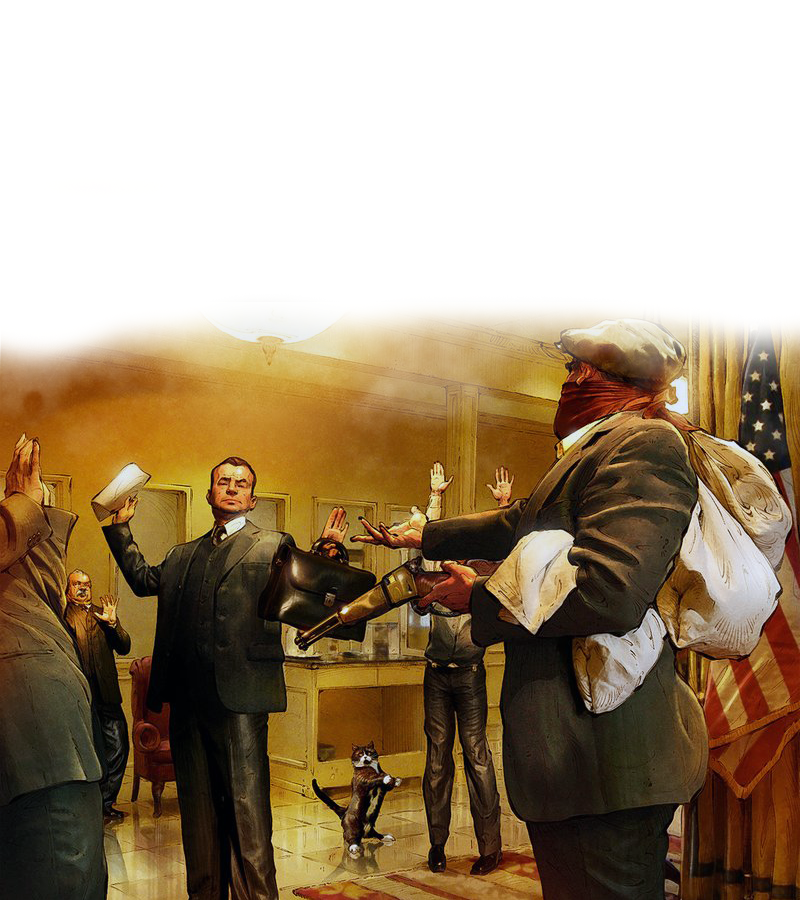
Optional Rules
Wealth and Reputation
The following rules present an alternative way to deal with wealth in a modern world, as well as a way to deal with the reputation of a particular character and what beneifts that might confer.
Characters have a Wealth score that reflects their total buying power. This is a composite of income, credit rating, and savings. Your wealth score serves as the measure of whether you can afford to purchase equipment and services.
Likewise, characters have a Reputation score that represents your social capital. You can Leverage your Reputation to request favours, requisition equipment, and turn social interactions in your favour.
1st-level characters generate these scores by rolling 2d4 for each of them, and adding any bonuses granted by their background. Additionally, characters add their Charisma modifier to their initial Reputation score.
Wealth
Over the course of play, your Wealth will fluctuate as you purchase expensive items and increase as you earn rewards. Your wealth can never fall below 0, and there is no upper limit on how high your wealth can climb.
Since Wealth is an abstracted number bundling together various real-world concepts, it can be difficult to determine how financially well off you are. To get a general sense of how financially solvent you are at any given time, check the following table.
| Wealth | Financial Condition |
|---|---|
| 0 | Impoverished or Indebted |
| 1-4 | Struggling |
| 5-10 | Middle Class |
| 11-15 | Affluent |
| 16-20 | Wealthy |
| 21-30 | Rich |
| 31 or higher | Filthy Rich |
Purchasing Equipment and Services
Wealth is used to determine what you can afford and what gear you might reasonably have access to. Every object and service has a Value rating, rather than an associated monetary cost.
While common objects are readily available, buying less common objects generally takes a number of hours equal to the Value of the object or service, reflecting the time needed to locate the wanted materials and close the deal.
Whether this is necessary is entirely dependent on the specific setting you are playing in and is down to GM discretion. For example, in some settings guns are readily available, whereas in others they are more difficult to acquire.
Any time you purchase an object or service with a Value higher than your current wealth, your wealth goes down.
How much your Wealth is reduced depends on how expensive the object is. Compare the Value of the item to your current Wealth score and consult the table below to see how much your wealth will decrease if you choose to purchase the item.

Along with this loss, any time you buy an object or service with a sale Value of 15 or higher, you reduce your current Wealth score by an additional 1 point.
This means if you are purchasing something with a Value less than your Wealth score, and with a Value less than 15, your Wealth is not reduced at all. The cost for the item is considered to fall easily within your financial capabilities without any noticeable effect.
| Value | Wealth Decrease |
|---|---|
| 15 or Higher | 1 point |
| 1-10 points higher than your Wealth | 1 point |
| 11-15 points higher than your Wealth | 1d6 points |
| 16-20 points higher than your wealth | 2d6 points |
Your Wealth only goes down if you choose to buy the object or service after the cost has been determined. If you choose not to buy the object or service, you can try again, but not until you have spent a number of hours equal to the value of the object or service representing the time spent trying to find a better price or circumstance.
Note that you cannot purchase an item that has a value that is more than 20 points higher than your current Wealth, nor can you successfully make a purchase that would reduce your Wealth lower than 0.
For example, if a character has a Wealth score of 9 currently, and they wish to purchase an item with a Value of 6, they can do so entirely within their expenses and without any Wealth loss. If the same character wanted to purchase an item with a Value of 16, their Wealth would reduce by 2 points (1 as it's Value is 1-10 points higher than their current wealth, plus 1 as it's Value is higher than 15).
Lining Your Pockets
There are a number of ways to increase your Wealth score.
Adventuring may result in finding valuable items. One way to gain Wealth is selling such items.
To sell something, you first need to determine its Value. Assuming the object is undamaged and in working condition, the sale value is equal to the object’s base Value (as if purchased new) minus 3. A damaged object may have it's Value reduced by as much as 10.
Selling an object provides equal to the amount of Wealth you would lose if you purchased an object with a Value equal to the sale Value. If you sell an item with a Value of at least 21 higher than your current Wealth, add an additional 1d6 Wealth per 10 points above 20.
You gain a Wealth increase of at least 1 whenever you sell an object with a sale Value of 15 or higher . If you sell an object with a sale value less than or equal to your current Wealth bonus, and that sale Value is 14 or lower, you gain nothing.
You cannot legally sell restricted objects unless you are licensed to own them, and there are usually further distribution licenses required. You also cannot legally sell objects that have been reported as stolen. Selling objects illegally usually requires that you have contacts in the black market, and reduces the sale Value by an additional 3.
Selling an object takes a number of hours equal to the normal Value of the item.
There are other ways to increase your Wealth score. If you are given a job by a patron, they will likely choose to pay you directly. If so, the reward will be given a Value, and your Wealth score increases as if you sold an object of that Value.
If your character is employed, they may be able to accumulate savings over time, which will translate to a Wealth increase. At the end of each month your character is employed, roll a d20. If the result is greater than their current Wealth, their Wealth increases by 1. For every 10 points by which you exceed your current Wealth, you gain an additional +1 to your Wealth score. Based on your job, the GM may allow you to add an appropriate ability score bonus to the check. Additionally, you may add your proficiency bonus to the check if you are proficient in a skill or tool which is appropriate to the job. For example, a history teacher may add their Intelligence or Charisma bonus to the check, and would add their proficiency bonus if they are proficient in the History skill.
Lifestyle
What sort of lifestyle does your character live? Do they drive an exotic car and own a speedboat, throwing lavish parties and flying off to Rio for the weekend?
Or do they subsist on microwave pizza in a one-room apartment? That question is answered, in part, by the objects you own and your current Wealth score.
A character with a mid-range Wealth score (say, 7) can generally afford items costing around $50 without their Wealth reducing. Such a character can afford a meal at a good restaurant, a ticket to a basketball game, or a new computer game pretty much any time they want. More expensive lifestyle options are always available, but only at the cost of driving their Wealth down - so they can’t really live beyond their means for long. Of course, if they already owns a Ferrari, having a lower Wealth score does not mean they have to give it up. They still drive an expensive car - they just can’t currently afford to do all the other things people associate with that kind of life.
A poorer character - perhaps with a current Wealth score of 4 - can generally afford a $20 expense without reducing their Wealth bonus. A night at the movies might be a routine entertainment, but they can’t regularly afford anything more expensive. Rich characters, those with Wealth scores of 15 or higher, can easily drop about $500 at a time, meaning that they will fly first class more often than not.
So How Much Money is in the Briefcase?
Sometimes you just need to know how much something is worth in cash terms. If someone flashes a briefcase full of money at you, it can break the immersion a little to just say it has a Value of 24.
It is often better to know that there’s $5,000 in the briefcase. It's also a good reference for if you’re going to split that reward five ways, and what the resulting Value of each share will be.
The following table puts a rough monetary range for most Values players will come into contact with.
While there is no technical limit to a character's Wealth, this table only gives monetary values for Values up to 50. If you require cash values for Value scores greater than this, it shouldn't be too difficult to get a rough estimate based on the patterns in the table.
On-Hand Objects
In the modern world, most people have a lot of stuff - probably a lot more than you’re going to write down on your character sheet. These rules account for the mundane and innocuous objects that most people have among their possessions and avoids forcing every character to specifically purchase such objects in order to employ them.
With the GM’s permission, you can roll a d20 and add your current Wealth score to see if you have a mundane object on hand, as long as the object has a value of 10 or lower. (The GM determines the value for an object that’s not mentioned in this document, using similarly priced objects as a guide.) The DC for this check is equal to 10 + the object’s value. You can only do this during play, not at character creation or between adventures. If you succeed, your Wealth score is unaffected, even if the object’s value is higher than your wealth score.
For example, Russell hears faint noises outside the to his apartment and suspects that someone is about to break in. His gun isn’t handy, but there might be something else in the room, such as a baseball bat or a fireplace poker, that can be used as an impromptu weapon. The GM decides that the Value for such an object is 5, To see mundane object is on hand, Russell rolls ld2O plus his current Wealth bonus, versus a DC 0f 15 (10 plus the Value of 5). On a a success, such an item is on hand, and Russell grabs it up as quickly can. On a failure, nothing of the sort is immediately available, and Russell has to figure out an alternative plan.
Depending on the situation, the GM can rule that a certain mundane object is not available; for an object to be obtainable, you must be in a place where the object logically would be (in your house, or apartment, or car); you can’t just come across a baseball bat while walking down the street. This condition may be waived if the character could reasonably be expected to be carrying such an item on their person.
Values and Dollar Amounts
| Value | Dollar Amount | |
|---|---|---|
| 2 | Less than $5 | |
| 3 | $5-$11 | |
| 4 | $12-$19 | |
| 5 | $20-$29 | |
| 6 | $30-$39 | |
| 7 | $40-$54 | |
| 8 | $55-$69 | |
| 9 | $70-$89 | |
| 10 | $90-$119 | |
| 11 | $120-$149 | |
| 12 | $150-$199 | |
| 13 | $200-$274 |
| Value | Dollar Amount | |
|---|---|---|
| 14 | $275-$349 | |
| 15 | $350-$499 | |
| 16 | $500-$649 | |
| 17 | $650-$899 | |
| 18 | $900-$1,199 | |
| 19 | $1,200-$1,499 | |
| 20 | $1,500-$1,999 | |
| 21 | $2,000-$2,749 | |
| 22 | $2,750-$3,499 | |
| 23 | $3,500-$4,999 | |
| 24 | $5,000-$6,499 | |
| 25 | $6,500-$8,999 | |
| 26 | $9,000-$11,999 |
| Value | Dollar Amount | |
|---|---|---|
| 27 | $12,000-$14,999 | |
| 28 | $15,000-$19,999 | |
| 29 | $20,000-$27,499 | |
| 30 | $27,500-$34,999 | |
| 31 | $35,000-$49,999 | |
| 32 | $50,000-$64,999 | |
| 33 | $65,000-$89,999 | |
| 34 | $90,000-$119,999 | |
| 35 | $120,000-$149,999 | |
| 36 | $150,000-$199,999 | |
| 37 | $200,000-$274,999 | |
| 38 | $275,000-$349,999 | |
| 39 | $350,000-$499,999 |
| Value | Dollar Amount | |
|---|---|---|
| 40 | $500,000-$649,999 | |
| 41 | $650,000-$899,999 | |
| 42 | $900,000-$1,199,999 | |
| 43 | $1,200,000-$1,499,999 | |
| 44 | $1,500,000-$1,999,999 | |
| 45 | $2,000,000-$274,999 | |
| 46 | $2,750,000-$3,499,999 | |
| 47 | $3,500,000-$4,999,999 | |
| 48 | $5,000,000-$6,499,999 | |
| 49 | $6,500,000-$8,999,999 | |
| 50 | $9,000,000-$11,999,999 |

Why not Just Track Money?
This financial system is abstract, and your Wealth isn't a precise measurement of your character's net worth. However, this system is simpler than tracking your paychecks, credit scores, bank statements, interest rates, and credit limits.
Modern personal finance can be extremely complex; this system saves you from spending as much effort on balancing your character's checkbook as you spend on your own
Rent or Own?
The rules for Wealth don’t say anything about paying rent or having a mortgage. That’s because such day-to-day expenses as a home, utility bills, and groceries are already built into the Wealth system - your Wealth reflects your buying power after paying for such basics.
Since the cost of rent is already built into your Wealth bonus, why should any character want to waste Wealth on something as expensive as a home? The answer in game terms is the same as in the real world: When you own your own home, you aren’t subject to someone else’s rules on how to use it. Want to build a secret lab in your garage? That’s kind of difficult in an apartment building - but you can probably do it if you own a house.
To buy a house, you only have to pay for the down payment (that’s what the Value in the Housing table represents). You don’t have to worry about the monthly mortgage payment, just as a renter doesn’t have to worry about rent.
Reputation
Over the course of play, your reputation will fluctuate as you gather more notoriety and as you leverage it for various advantages. Your reputation can never fall below 0, and there is no limit to how high your reputation can climb.
Leveraging Your Reputation
Reputation is used to measure your social capital and the influence that you can exert. Similarly to objects and services, favours and requisitions have a Value rating. Any time you Leverage your Reputation to gain a favour or requisition equipment with a Value higher than your current Reputation, your Reputation goes down. How much your Reputation is reduced depends on how valuable the favour or equipment is.
Compare the Value of the favour or item to your current Reputation score and consult the table below to see how much your Reputation will decrease if you choose to go through with the request.
| Value | Reputation Decrease |
|---|---|
| 15 or higher | 1 point |
| 1-10 points higher than your Wealth | 1 point |
| 11-15 points higher than your Wealth | 1d6 points |
| 16-20 points higher than your wealth | 2d6 points |
This system is functionally identical to purchasing items using Wealth. You cannot request a favour or requisition that is more than 20 points higher than your current Reputation. If your reputation drops to 0, you have exhausted your social capital and cannot request favours or requisition equipment until you have regained some of your Reputation.
So you wanna be Famous?
There are a number of ways to build your Reputation. You can spend your downtime rubbing elbows with the elite in your circles. Keep track of the hours you spend networking. When you have accumulated a number of hours equal to your current Reputation score, your Reputation score increases by 1, and you reset your accumulated hours to 0
Your reputation can also grow as you go about your daily life. At the end of each month, make a Charisma check. If the result is higher than your current Reputation, your Reputation increases by 1.


You may also gain Reputation increases when completing missions, objectives, or goals. Guidelines for appropriate rewards are given below.
| Significance of Objective | Reputation Increase |
|---|---|
| Minor | 1 |
| Major | 2 |
| Critical | 4 |
Calling in Favours
Favours make the world go ‘round, and you’ll probably want to call in your fair share of them. Favours have a Value rating commensurate with the risk they carry for the one granting the favour, and following the rules for Leveraging your Reputation presented above.
Remember, though, that no matter how much social capital you’ve gathered, the person you ask a favour from can always say no to a particularly dangerous or suicidal request Similarly, the GM can rule that the Value for a Favour from a particular individual might be reduced owing to the relationship between them and the character requesting the favour.
| Apparent Risk | Value |
|---|---|
| None | 10 (5 + 2d4) |
| Slight (Minor social consequences) | 15 (10 + 2d4) |
| Moderate (Retribution or Minor legalproblems) | 20 (15 + 2d4) |
| Extreme (Severe retribution or Majorlegal problems) | 30 (20 + 4d4) |
| Deadly (Threats or attacks on theirperson, friends, or family) | 50 (30 + 8d4) |
Requisitioning Equipment
Those with connections to powerful organizations can often leverage equipment and services that they would otherwise be unable to acquire using personal wealth. The organization evaluates whether you really need the object, how soon they can supply it, and whether they can reasonably expect to get it back when you are done with it.
Requisitioning an item works just like purchasing the item, except you use your Reputation in place of your Wealth, and apply modifiers to the item's Value.
The following table displays all the modifiers that might be reasonably added to the item's Value for the purposes of requisitioning.
Compare your Reputation to the final requisition Value of the item you are requisitioning, and lower your Reputation as if you had just purchased the item. The organization has final say over whether they can supply the object requested, and if they can do so, will provide the item within a number of hours equal to the item’s value.
| Situation | Value Modifier |
|---|---|
| Object is necessary for assignment | -6 |
| Object has obvious application for assignment | -4 |
| Object has peripheral application for assignment | -2 |
| Object has no obvious application for assignment | +2 |
| Object is rare | +2 |
| Object is restricted (See Equipment) | |
| - Licensed | +2 |
| - Restricted | +4 |
| - Military | +6 |
| - Illegal | +8 |
| Character is proficient in use of object | -2 |
| Character returned any requisitioned gear undamaged on previous assignment | -2 |
| Assignment was set by the organisation being requisitioned* | -2 |
* Additionally, when the assignment was set by the organisation being requisitioned, if the item is returned undamaged you regain half the Reputation spent requisitioning it (round up).

For example, Sadie has a Reputaion of 9, and wants to requisition a machine gun. The mission will almost certainly involve combat, and she turned in all her requisitioned gear undamaged after her last assignment.
The Value of a machine gun is 19, but it is considered necessary for the assignment (-6), Sadie is proficient in it's use (-2), she returned all her gear undamaged (-2), the machine gun is most likely Restricted (+4) at the very least (See Equipment), and the assignment was set by the organisation being requisitioned (-2). This gives a final value of 11. Sadie is able to requisition the weapon at a cost of 1 reputation.
Additionally, Sadie is requisitioning the item from the same organisation who set the assignment, so if Sadie returns the machine gun undamaged, she would regain the 1 Reputation point spent requisitioning it (half of 1 rounded up is 1).
Do I know you?
To determine if one character recognises another based on their Reputation, roll a d20. If the result is lower than the target's Reputation score, the target is recognised. As with requisitioning equipment, certain modifiers may apply to the target's Reputation score for the purposes of being recognised, as described in the following table.
If the character is acquainted with the target, they automatically recognise them without having to make a roll, unless there is a good reason for them not to.
| Situation | Reputation Modifier |
|---|---|
| Character has extensive knowledge of the field(s) making the target renowned | +6 |
| Character is fairly involved in the field(s) making the target renowned | +4 |
| Character is peripherally involved in the field(s) making the target renowned | +2 |
| Character has no connection to the field(s) making the target renowned | -2 |
If the target is disguised, usually the character must pass a check to see through the disguise before attempting to recognise the target.
When a player character is recognised, they may gain advantage or disadvantage on certain checks, depending on whether their Reputation puts them in a positive or negative light to the individual recognising them, as determined by the GM. For example, a character recognised as an infamous criminal would likely gain disadvantage on many social checks involving law enforcement, but may gain advantage on Intimidation checks.
Additional Uses for Reputation
Certain Advance Class features may give you alternative ways to Leverage your Reputation to give various benefits. If you aren't using the Reputation system, alternative abilities with similar functions are provided.
Credits
Document and contents by Dylan Richards (Reddit: u/Altavus , Tumblr: decision-paralysis, Blogger: Decision Paralysis)
Art
Optional Rules
Bank Vault: TamasGaspar on DeviantArt. Bank Robbery: TamasGaspar on DeviantArt. Multi Pass: Matt Tkocz on ArtStation Mafia Boss: Kperfect on DeviantArt Medal Ceremony: openclipart The Meeting: Karla Oritz
Source Material
"d20 Modern" role-playing game by Wizards of the Coast.
Built heavily upon "d20 Modern 5e Conversion" by Edward Wilson.